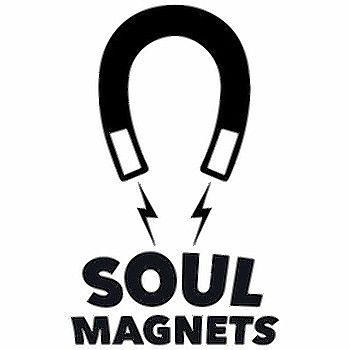Soul Magnets began as a covers-only outfit, but it wasn’t long before local label Peace & Rhythm Records asked if it had any original material. The funky creative wheels began turning.
And the Soul Magnets’ first two official recordings were finally released on its Bandcamp page earlier this month. The band’s core lineup include guitarist Luke Jaeger, saxophonist and horn arranger Dave Trenholm, trumpeter Fred Hooven and trombonist Zippy Paige (both also in the Expandable Brass Band), bassist Chris Fournier and drummer J.J. O’Connell, plus various backing vocalists. The song “Get Over Yourself,” written by Smith, has jazzy chords and a horn section that pops brightly, like on the Chicago smashes of the ’70s. “Redacted,” co-written by Jaeger and his wife, Shoshana Marchand, snaps at a faster funky clip, with tight rhythm guitar and an extended-mix breakdown with percussion and funky bass.
I spoke with the three writers about the debut tunes.
Ken: Luke and Shoshana, what inspired “Redacted”?
Luke: It started out as just a title. I asked Shoshana to write the lyrics because she’s simply a far better writer than I am. She wrote them really fast and in a fully formed way. That would have taken me at least a year. It’s like one of those George Clinton songs where he takes some random phrase and squeezes every last pun and double entendre and internal rhyme out of it.
Shoshana: I was away on a trip to sing Balkan music. [Luke and I] were talking on Skype and he reminded me about needing original songs. I was in a hotel in Bulgaria, surrounded by people who didn’t speak any English, reading something online about the Edward Snowden leaks, and all the official documents were marked ‘redacted’. So I had a lot of fun coming up with rhymes for ‘redacted’: macked it, packed it, vacced it, etc. Of course the song isn’t about Snowden, it’s about a love affair gone wrong.
Ken: Kaliis, what led you to write “Get Over Yourself”?
Kaliis: It was initially supposed to be a break-up song, but ended up being a lot about the frustrations I feel as a person of color in progressive areas. I think it functions on both levels though, weirdly enough. I’d had the melody kicking about for a little bit. The words were harder, but then lyrics are always a harder thing for me. It’s drought or deluge, the way I write.
Luke: Kaliis actually wrote it over an Oddisee track, a one-chord groove. But then we peeled the melody off, and our chord progression suggested itself. I was thinking about some of those mid-tempo Al Green songs like “Call Me” and “Tired Of Being Alone,” or “I’ll Be Around” by The Spinners— they have an understated, intimate sound, and I love how they start quiet and build up. At some point I latched onto the idea that Fred should play a laid back, Chet Baker-ish muted trumpet solo on the outro.
For the “Redacted” horn parts, we wanted to capture something like the flavor of “Another Star” by Stevie Wonder, that combination of melodic lines and percussive hits. The horn players had a real workout playing these parts — they’re challenging!
Ken: What are some of the band’s influences that show up in these original songs?
Luke: Parliament, James Brown, Prince, Stevie Wonder, the Stax house band, Chic … to name a few. Maybe Joan Armatrading, because Kaliis’ voice reminds me of her sometimes. And I’m a sucker for the melodic R&B that was on black radio during the brief post-disco, pre-hip-hop era of the early ’80s. “And The Beat Goes On” by The Whispers, “Mama Used To Say” by Junior, etc. Also, wow, remember “black radio”? It’s hard to believe how segregated radio was, and for how long.
I think of myself as primarily a rhythm player, so my guitar heroes are people like Jimmie Nolen, Teenie Hodges, Steve Cropper and Nile Rodgers. They don’t play a lot of solos, and I guess I don’t either. When I do solo, I try to think: what would Albert King do? Play less, don’t bury the groove!
Ken Maiuri can be reached at clublandcolumn@gmail.com.




